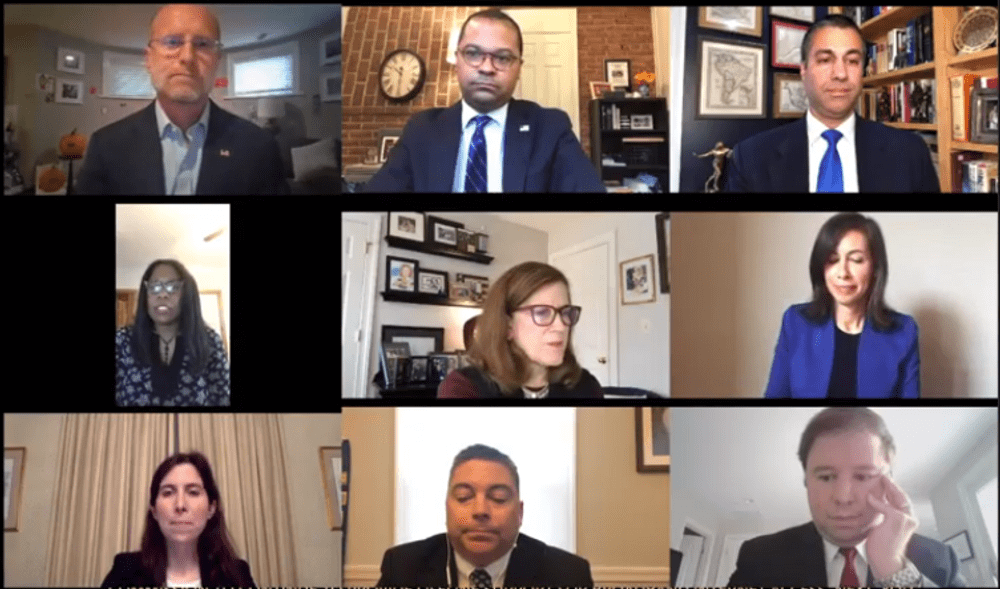Federal Communications Commission Vote on Net Neutrality Reprises Deep Partisan Divisions
October 27, 2020 — Tensions ran high during the Federal Communications Commission’s October meeting on Tuesday, as the agency’s five commissioners were forced to take a defining partisan vote in response to the D.C. Court of Appeals remand on the agency’s December 2017 repeal of net neutrality rules
Jericho Casper

October 27, 2020 — Tensions ran high during the Federal Communications Commission’s October meeting on Tuesday, as the agency’s five commissioners were forced to take a defining partisan vote in response to the D.C. Court of Appeals remand on the agency’s December 2017 repeal of net neutrality rules.
In 2017, the Republican-led Trump FCC ended less than three years of what some have criticized as utility-style regulation of the internet. Under Chairman Ajit Pai, the agency returned broadband internet access service to its long-standing classification as an information service under Title I of the Communications Act.
The circuit court upheld the vast majority of the Restoring Internet Freedom Order, but remanded three discrete issues for further consideration. These were its impact upon public safety, pole attachments, and universal service support for low income consumers through the Lifeline Program.
See “D.C. Circuit’s Decision in Net Neutrality Case Likely to Open New Fronts of Attack Against FCC,” Broadband Breakfast, October 7, 2019
During Tuesday’s meeting, the commissioners voted 3-2 on party lines to conclude that there was no basis to alter the agency’s conclusions from 2017.
“Competition has increased,” said Commissioner Brendan Carr, “with the percentage of Americans with more than two options for high-speed internet increasing by 52 percent, all while prices have been decreasing.”
Yet they largely avoided mention of the issues surrounding utility pole attachments and the Lifeline program, Republican commissioners talked about how different nations’ internet networks are holding up in comparison to the United States. They also joked about potentially having to pay for social media posts.
Carr said that the networks of counties that have taken a heavier or utility-style approach to regulating the internet have “strained to maintain quality and speed” throughout the global pandemic, referencing when European Union officials, in March, asked Netflix to reduce its video streaming quality to reduce network strain.
Chairman Ajit Pai reverted to emotional appeal, saying his family received violent death threats following the 2017 repeal Opponents of his ”internet freedom” order waged, he said, “one of the most dishonest scare campaigns ever seen.”
Pai maintained that the internet economy is as good as ever, with internet speeds and coverage readily increasing under his leadership.
Democrats say FCC data shows broadband markets are not competitive
Democratic Commissioners criticized the GOP members for doubling down on the issue in the midst of the pandemic. They urged greater regulation of broadband services.
Commissioner Jessica Rosenworcel disagreed with the idea that the 2017 net neutrality repeal aided consumers. “FCC data shows that our broadband markets are not competitive. Many in this country have no choice in broadband providers,” said Rosenworcel, adding that “this administration is suing states that try to close the broadband void created when the FCC stepped out.”
She called today’s vote an opportunity for the agency to step back in, saying the rollback of net neutrality does not get the country any closer to broadband for all. Rosenworcel also called for broadband to be regulated similarly to utilities, such as water and electricity.
Commissioner Geoffrey Starks criticized Carr and Pai’s arguments, saying that the successes of American networks are not due to changes on net neutrality. He further argued about negative outcomes for the FCC’s Lifeline Program because of reduced FCC authority to oversee ISPs.
“When the FCC added broadband access to Lifeline it was based under its Title II authority,” he said, adding “now with this strained legal reasoning the majority would rather disconnect over 8 million Lifeline subscribers, rather than subject ISPs to any FCC oversight.”
Starks said that of nearly 300 broadband plans in 28 cities across the world, the United States has the highest average monthly prices for home broadband.
“30 percent of Black, Latinx, and other non-white households earning less than $30,000 a year have missed at least one internet bill since the pandemic,” Starks said.
Referencing the Chairman’s Keep Americans Connected Pledge, Starks said “While I’m glad internet service providers pledged not to disconnect consumers, the order has removed the FCC’s ability to enforce this voluntary commitment. The pledge ended five months ago. As our country faces historic levels of unemployment and economic distress, the FCC has no authority to prevent providers from disconnecting customers who cannot pay their bills.”









Member discussion